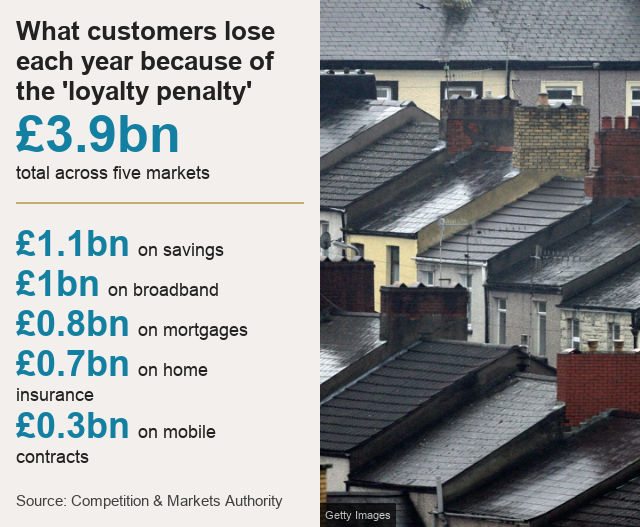Insurer 'made money from my loyalty'
- Published
Nick Munday slashed his insurance bill by switching providers
Loyalty came at a cost for Nick Munday - a cost that can be calculated at £1,250 a year.
The 61-year-old had been a home and contents insurance customer with the same provider for 20 years, and was eventually paying £2,000 a year.
One call querying the cost suggested he could pay a premium to £750.
Now the UK's competition watchdog has said millions of unsuspecting customers were being exploited by bad practices by firms.
It has responded to a so-called super complaint from Citizens Advice which argues that loyal customers are being "ripped off" for mobile, broadband, savings, home insurance and mortgage deals.
Findings by the Competition and Markets Authority, external (CMA) included year-on-year "stealth price rises", costly exit fees, difficulties for customers to cancel contracts or switch providers, and consumers being required to automatically renew a contract.
Andrea Coscelli, chief executive of the CMA said: "Our work has uncovered a range of problems which leave people feeling ripped off, let down and frustrated. They shouldn't have to be constantly on guard, spending hours searching for or negotiating a good deal, to avoid being trapped into bad value contracts or falling victim to stealth price rises.
"Millions of loyal or vulnerable customers are being taken advantage of each year by firms - and end up paying much more than they should do. This must come to an end."
It backed up Citizens Advice claims that customers who stick with their supplier are losing a total of about £4bn a year, the equivalent to an average of £877 per person.

That cost was higher for Mr Munday. He said his insurance premium with Santander was £2,000 a year, having used their services for two decades.
When he shopped around, he was quoted a price of £469 from another provider. He contacted Santander, which said premiums for new customers could be as little as £750.
"It is despicable. They are treating loyal customers really poorly," he said.
"Loyalty should be worth something. It would be good if big companies rewarded people accordingly."
He said that putting up premiums each year was "an easy way for them to make more money". For him, a saving of £100 a month was an important difference.

How to start beating the loyalty penalty
Switching is not always easy, but the government-backed Money Advice Service, external has some tips for consumers:
Haggle on deals such as broadband contracts - find out exactly what is being offered elsewhere and ring up your provider, select the "thinking of leaving" option, and get through to the retention or disconnection team
A pay-as-you-go mobile phone does not require a credit check, so this could be a better option for those with a chequered credit history
The mobile phone handset makes the biggest difference to your bill. If you are happy with your handset, or can buy one separately, consider switching to a SIM-only deal
When choosing insurance, check more than one price comparison website as they do not all cover the same companies, work out which cover is required, and check if choosing home and contents insurance from the same provider is cheaper

Santander said that the cost reflected some claims made on the policy. It said that a renewal notice would have pointed out that he may have received a better deal with another product from Santander or elsewhere. The bank said that if he had wanted a policy that was exactly the same as his current one, it would have cost more than £750 even if he was a new customer.
"Santander is constantly working to ensure that our prices are fair and competitive," it said.
"We will continue to do this and the Citizens Advice super complaint and recent-announced FCA market review will be a key consideration for us."
Why is he not the only example?
Citizens Advice said it knew of a couple aged in their 90s who were paying £1,000 a year too much for their home insurance, having been with the same company for six years.
It said that was an example of a wider issue. In its complaint, it said problems had been detected in five particular areas:
savings accounts
mortgages
household insurance
mobile phone contracts
broadband contracts
This super complaint requires a response from the CMA which has now been published.
Citizens Advice described the CMA's report as a strong response, and said regulators must now follow this up in the deadline for progress of six months set by the CMA.
"The CMA is clear that nothing should be off the table when it comes to tackling the loyalty penalty, including targeted price caps, so we are expecting bold action," said Gillian Guy, Citizens Advice chief executive.
In the meantime, the insurance and telecoms industries have made changes aimed at reducing the impact of higher charges for loyal customers. UK Finance, which represents banks and lenders, said it was investigating more help for longstanding mortgage customers, and had introduced prompts to make interest rates clear to savers.
What has the competition watchdog said it will do?
The CMA said that millions of people had been "exploited" as a result of practices in these markets.
This ranged from about one million people being affected in the mortgage market to 12 million in the insurance sector.
It said vulnerable people, including the elderly and those on low incomes, were most at risk of paying a loyalty penalty.
As a result, it has opened a consumer law enforcement investigation in the anti-virus software sector, and warned that it could follow suit in other sectors.
It has also outlined various recommendations to regulators and government, including targeted price caps to protect the vulnerable.

The watchdog suggested that Ofcom introduces regulation to stop mobile providers charging pay-monthly customers the same rate once they had effectively paid off their handsets at the end of the minimum contract period.
Some providers are already following that rule.
It added that the City regulator, the Financial Conduct Authority (FCA), should "look closely" at evidence that insurance firms continually raised prices and take action to prevent people being exploited. This should include considering "pricing interventions".
Mr Coscelli, of the CMA, told BBC Radio 4's Today programme that "aggressive discounts" benefitted new customers, but after "taking a step back" the picture did not look so good for consumers.
"We like the deals to new customers, we like new companies coming in with new ideas, and they need to have a chance to succeed in new markets," he said.
"What we are saying to companies is they need to assess their practices and see whether they are legal, and to decide if they should continue as they do or change some of their approaches."
Huw Evans, director general of the Association of British Insurers, said: "Three quarters of insurance customers benefit from shopping around, but we accept there needs to be a better balance between the deals offered to new consumers and the interests of long-standing customers."
Business Secretary Greg Clark said companies continuing to take advantage of loyal consumers should know that the government would intervene.
"We will publish a comprehensive Consumer White Paper in the first part of next year to ensure markets provide consumers with competitive prices and quality products and services," he said.
- Published19 December 2018

- Published28 September 2018

- Published21 March 2018

- Published27 August 2018

- Published8 May 2018
